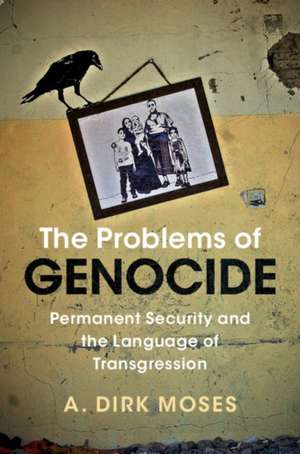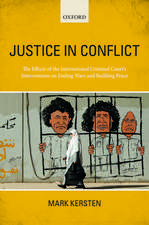The Problems of Genocide: Permanent Security and the Language of Transgression: Human Rights in History
Autor A. Dirk Mosesen Limba Engleză Paperback – 3 feb 2021
| Toate formatele și edițiile | Preț | Express |
|---|---|---|
| Paperback (1) | 242.08 lei 3-5 săpt. | +31.01 lei 7-13 zile |
| Cambridge University Press – 3 feb 2021 | 242.08 lei 3-5 săpt. | +31.01 lei 7-13 zile |
| Hardback (1) | 714.51 lei 6-8 săpt. | |
| Cambridge University Press – 3 feb 2021 | 714.51 lei 6-8 săpt. |
Din seria Human Rights in History
-
 Preț: 232.45 lei
Preț: 232.45 lei -
 Preț: 277.57 lei
Preț: 277.57 lei -
 Preț: 286.30 lei
Preț: 286.30 lei -
 Preț: 230.61 lei
Preț: 230.61 lei -
 Preț: 230.10 lei
Preț: 230.10 lei -
 Preț: 232.73 lei
Preț: 232.73 lei -
 Preț: 184.88 lei
Preț: 184.88 lei -
 Preț: 312.46 lei
Preț: 312.46 lei -
 Preț: 255.09 lei
Preț: 255.09 lei -
 Preț: 276.61 lei
Preț: 276.61 lei -
 Preț: 201.76 lei
Preț: 201.76 lei -
 Preț: 281.30 lei
Preț: 281.30 lei -
 Preț: 232.24 lei
Preț: 232.24 lei -
 Preț: 310.51 lei
Preț: 310.51 lei - 8%
 Preț: 564.42 lei
Preț: 564.42 lei - 9%
 Preț: 593.66 lei
Preț: 593.66 lei -
 Preț: 194.09 lei
Preț: 194.09 lei -
 Preț: 230.51 lei
Preț: 230.51 lei -
 Preț: 227.33 lei
Preț: 227.33 lei - 14%
 Preț: 895.53 lei
Preț: 895.53 lei - 11%
 Preț: 597.10 lei
Preț: 597.10 lei -
 Preț: 320.75 lei
Preț: 320.75 lei -
 Preț: 216.39 lei
Preț: 216.39 lei -
 Preț: 280.74 lei
Preț: 280.74 lei -
 Preț: 288.42 lei
Preț: 288.42 lei - 14%
 Preț: 757.85 lei
Preț: 757.85 lei - 11%
 Preț: 600.84 lei
Preț: 600.84 lei -
 Preț: 264.74 lei
Preț: 264.74 lei -
 Preț: 233.22 lei
Preț: 233.22 lei -
 Preț: 327.51 lei
Preț: 327.51 lei -
 Preț: 272.75 lei
Preț: 272.75 lei - 11%
 Preț: 537.58 lei
Preț: 537.58 lei -
 Preț: 288.25 lei
Preț: 288.25 lei - 14%
 Preț: 708.38 lei
Preț: 708.38 lei -
 Preț: 225.97 lei
Preț: 225.97 lei
Preț: 242.08 lei
Nou
Puncte Express: 363
Preț estimativ în valută:
46.32€ • 48.36$ • 38.34£
46.32€ • 48.36$ • 38.34£
Carte disponibilă
Livrare economică 15-29 martie
Livrare express 01-07 martie pentru 40.100 lei
Preluare comenzi: 021 569.72.76
Specificații
ISBN-13: 9781107503120
ISBN-10: 1107503124
Pagini: 610
Dimensiuni: 152 x 228 x 34 mm
Greutate: 0.81 kg
Editura: Cambridge University Press
Colecția Cambridge University Press
Seria Human Rights in History
Locul publicării:New York, United States
ISBN-10: 1107503124
Pagini: 610
Dimensiuni: 152 x 228 x 34 mm
Greutate: 0.81 kg
Editura: Cambridge University Press
Colecția Cambridge University Press
Seria Human Rights in History
Locul publicării:New York, United States
Cuprins
Introduction: The Problems of Genocide; Part I. The Language of Transgression: 1. The Language of Transgression, 1500s to 1890s; 2. The Language of Transgression, 1890s to 1930s; 3. Raphael Lemkin and the Protection of Small Nations; 4. The Many Types of Destruction; 5. Inventing Genocide in the 1940s; Part II. Permanent Security: 6. Permanent Security in History: Empire and Settler Colonialism; 7. The Nazi Empire as Illiberal Permanent Security; 8. Human Rights, Population 'Transfer', and the Foundation of the Postwar Order; 9. Imagining Nation-Security in South Asia and Palestine: Partition, Population Exchange, and Communal Hostages; Part III. The Language of Transgression, Permanent Security, and Holocaust Memory: 10. Lemkin, Arendt, Vietnam, and Liberal Permanent Security; 11. Genocide Studies and the Repression of the Political; 12. Holocaust Memory, Exemplary Victims, and Permanent Security Today.
Recenzii
'This refreshingly original book turns the problem of genocide on its head. Contrariwise to international law and the dominant memory regimes, Moses points at the aspiration for permanent security as the crux of the matter. Passionate and historically sweeping.' Maria Mälksoo, author of The Politics of Becoming European: A Study of Polish and Baltic Post-Cold War Security Imaginaries
'A pioneer of genocide studies, A. Dirk Moses has written a terrific, transgressive book destined to upend the field he has helped to define. Uncomfortable with morality tales, Moses is intent on smashing the hierarchy of international crimes established in the aftermath of World War II. A gut punch to conventional wisdom, this is critical global history at its best.' Jens Meierhenrich, author of Lawfare: A Genealogy (forthcoming)
'This brilliant, closely argued, and exhaustively referenced book makes a deeply persuasive case for replacing the prism of genocide with the crime of permanent security, calling out the multiple standards at play in the global order. A seminal paradigm-changer.' Nandini Sundar, author of The Burning Forest: India's War Against the Maoists
'Dirk Moses is the most original and provocative scholar writing on the problem of genocide. At its core deeply humanitarian, his book challenges every comfortable assumption of the meaning of genocide. This is essential reading for everyone concerned with human rights and mass atrocities.' Eric D. Weitz, author of A World Divided: The Global Struggle for Human Rights in the Age of Nation-States
'The Problems of Genocide can be strongly recommended to readers of this journal who have an interest in the macro-issues relating to criminal law and criminal justice, broadly conceived.' David O. Friedrichs, Rutgers
'Highly recommended.' A. Kolin, Choice Magazine
'… The Problems of Genocide is possibly one of the most significant works on the intellectual history of genocide ever since the notion entered the realm of the history of ideas.' Dimitrios A. Kourtis, Journal of Conflict and Security Law
'Moses' study makes numerous contributions to various literatures and disciplines … The author postulates a paradigm shift in genocide research, security studies and international law … [His] book is necessary and admirable.' Norbert Finzsch, H-Soz-Kult
'A pioneer of genocide studies, A. Dirk Moses has written a terrific, transgressive book destined to upend the field he has helped to define. Uncomfortable with morality tales, Moses is intent on smashing the hierarchy of international crimes established in the aftermath of World War II. A gut punch to conventional wisdom, this is critical global history at its best.' Jens Meierhenrich, author of Lawfare: A Genealogy (forthcoming)
'This brilliant, closely argued, and exhaustively referenced book makes a deeply persuasive case for replacing the prism of genocide with the crime of permanent security, calling out the multiple standards at play in the global order. A seminal paradigm-changer.' Nandini Sundar, author of The Burning Forest: India's War Against the Maoists
'Dirk Moses is the most original and provocative scholar writing on the problem of genocide. At its core deeply humanitarian, his book challenges every comfortable assumption of the meaning of genocide. This is essential reading for everyone concerned with human rights and mass atrocities.' Eric D. Weitz, author of A World Divided: The Global Struggle for Human Rights in the Age of Nation-States
'The Problems of Genocide can be strongly recommended to readers of this journal who have an interest in the macro-issues relating to criminal law and criminal justice, broadly conceived.' David O. Friedrichs, Rutgers
'Highly recommended.' A. Kolin, Choice Magazine
'… The Problems of Genocide is possibly one of the most significant works on the intellectual history of genocide ever since the notion entered the realm of the history of ideas.' Dimitrios A. Kourtis, Journal of Conflict and Security Law
'Moses' study makes numerous contributions to various literatures and disciplines … The author postulates a paradigm shift in genocide research, security studies and international law … [His] book is necessary and admirable.' Norbert Finzsch, H-Soz-Kult
Descriere
A. Dirk Moses historically delineates the problems of genocide as a concept in relation to rival categories of mass violence, like crimes against humanity and war crimes, and suggests an alternative understanding of the causes and categorization of civilian destruction.



